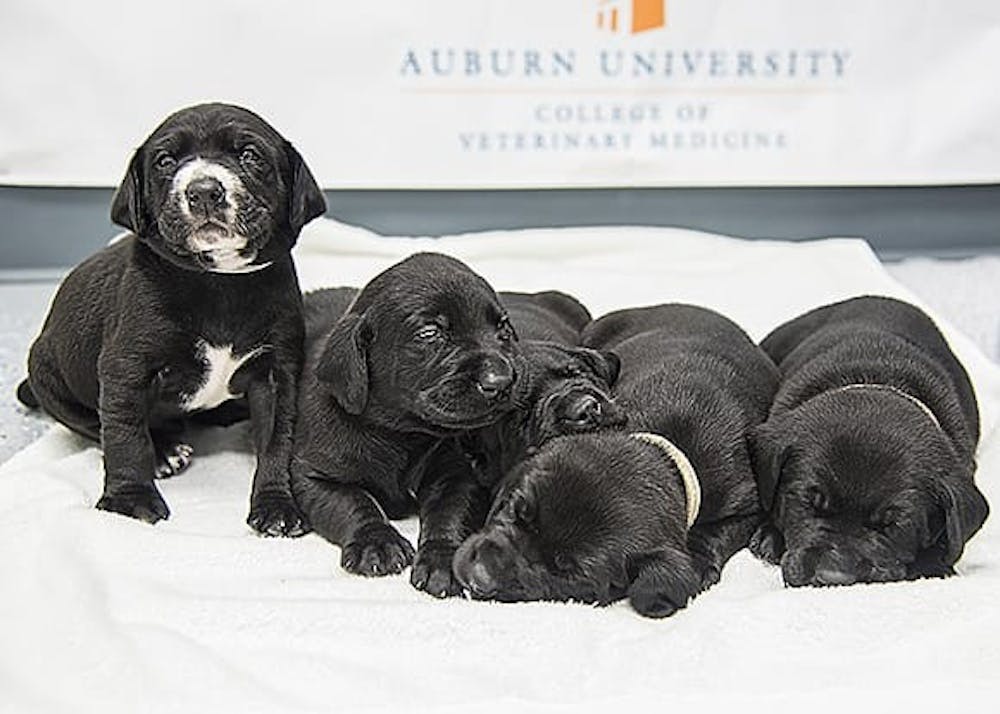Brown, black and yellow Labradors become prepared professionals through Auburn University's Canine Protective Services program, which saw $36,745 in funding as part of Tiger Giving Day. The program nourishes the dogs from birth to 12 months to see them lead a life of fighting crime.
Pam Haney, manager of Auburn’s CPS program, explained how after 7 weeks old, the puppies start intermediate training.
“We have a full-year development plan for these puppies, and it starts essentially at birth,” Haney said. “It's just like school until the dogs are 12 months of age. After 12 months, the dogs come out of the program and into whatever line of work that suits them - most ideally, they’ll be an explosive detection dog”.
Haney said the dogs are prepared through their program to eventually be moved to Vapor Wake K9, a K9 training academy in Anniston, Alabama, partnered with the University. The academy markets protection dogs capable of using air currents to locate target sources in large venues with lots of multi-directional traffic, such as airports, she said.
About 60 to 80 dogs a year come through the CPS program depending on the average litter size in that year, according to Haney. About 25% of those dogs stay for various research by the students and faculty. Out of the other 75%, 15% of those become breeders, and the rest are sold to different entities such as the government, VWK9 and GK9S, or Global K9 Solutions.
Although the CPS program specializes in preparing the dogs to be Vapor Wake detection dogs, not all the puppies become crime fighters. Part of the job of Auburn’s CPS staff is to place the dog in a job where it feels most comfortable. That could be in the military, as a breeder or even as a therapy dog.
“One of the biggest [jobs] I think that we have is placing the dog where it is best suited,” Haney said. “We have this very narrow, tailored goal to achieve a dog that can do this Vapor Wake repertoire ... but each dog has an individual personality, and we have to figure out what they like to do best. At the end of the day, the dog ultimately chooses its [own] job.”
Haney said that if a dog ends up being a breeder, it means that its genes are among the best of the best. One mother dog can have around two to three litters in her lifetime.
One puppy costs about $17,000 to raise, Haney said. The funding from Tiger Giving Day will go to everything from basic needs of the puppies, like food, vaccinations and bedding, all the way to any kind of care the mother dog might need. Things like health exams, orthopedic screenings, radiographs, toys, collars and even trainers will all be obtained with the funding that was received through Tiger Giving Day.
Auburn’s CPS program does more than just breeding, raising and training puppies, Haney said. Trainers observe behavior of the dogs, such as the interactions between the mother and litter, to understand the dogs’ overall development.
“This money [also] helps support the advancement of technology,” Haney said. “We talk about research and really understanding how to advance [technology]. The money funds the overreaching aspect of understanding how to raise dogs.”
Haney expressed her gratitude on behalf of the entire CPS program for the funds received through Tiger Giving Day.
“These are Auburn University’s dogs,” Haney said. "The students recognize that there is a community of people that are helping raise these dogs ... it’s very exciting."
Do you like this story? The Plainsman doesn't accept money from tuition or student fees, and we don't charge a subscription fee. But you can donate to support The Plainsman.





